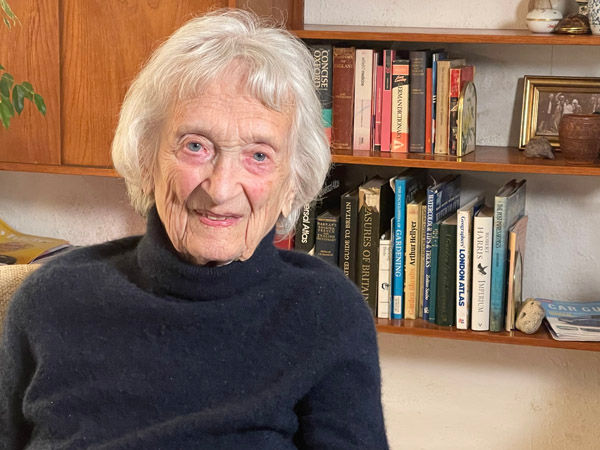I'm a paragraph. Click here to add your own text and edit me. It's easy.
I'm a paragraph. Click here to add your own text and edit me. It's easy.
I'm a paragraph. Click here to add your own text and edit me. It's easy.
Latest:

The copyright of all photographs belongs to individual interviewees. Please get in touch for more information
Ann Callender




Arrived in Britain:
Place of Birth:
Born:
January 1939
1919
Interview number:
Experiences:
RV
273
Interviewer:
Dr Bea Lewkowicz
Date of Interview:
Monday, 23 January 2023
Interview Summary:
Annelis Callender was born in 1919 in Berlin and grew up in Wilmersdorf with her parents Friedrich Kassel and Alice Kassel nee Erlenbach and her sister Brigitte.
Her father was a Regierungsbaumeister and worked for a Swiss company. She describes a happy a childhood living in a spacious flat in a beautiful part of Berlin with holidays in Switzerland. She experienced discrimination for the first time in 1934 when some of her friends did not show up for her birthday party. It was only at that point that her parents told her that the family was Jewish. In 1935 Jews had to leave the Hohenzollerngymnasium and she was sent to an American school. Shortly after, her parents decided that she should attend first a Commercial school in Neuveville and then a Housekeeping College in Geneva. She describes that she felt lonely and that she did not want to be separated from her parents.
Her parents experienced Kristallnacht in Germany and her father was arrested and sent to Dachau concentration camp. Ann does not know how her parents arranged the family’s emigration. She was told that she should travel to the UK, where she got a position as an au-pair in Cambridge. She was happy with the family and not treated like a servant. But after some time, the family relocated and Anne had to take another position with a professor in Cambridge, where she lived in the attic room and had to complete many household chores. When her mother joined her in Cambridge, they rented a room and worked as cleaners. Her father was interned on the Isle of Man and her sister went to stay with a family in Scotland, where she completed her education.
Ann worked in various jobs and in 1941 she married Maurice Callender (from Durham). He was a pilot with the Royal Air Force and her first son was born shortly after. After the war, they had another son and the family settled eventually in Stanmore. Ann’s husband joined the Civil Service and in the seventies was sent to Canberra, Australia to join the British Mission, where they stayed for five years. For some time, Ann worked as a part-time French teacher. She feels very British and has not been affiliated with any refugee organisations. She has grandchildren and great-grandchildren and is still very active at the age of 103.
Additional Comments:
Key words: Berlin. Hohenzollerngymnasium. Switzerland. Neuveville. Cambridge. Domestic Service Visa. Canberra. British Foreign Service.
When Hitler came I was once put in front of the class to show this is what a typical German girl looks like, because I had blue eyes & blonde hair. But not long after that I was chucked out of the school because I was Jewish, although I didn't really know it until my birthday. A polite letter, sorry, etc, etc, etc.
I think it was my 14th birthday when nearly all the girls who had been invited had some sort of excuse for not coming. Then I was told that I was Jewish. I didn't even know what it meant because we didn't keep anything. Oh, we did keep Christmas, we had a Christmas tree, but in a non-religious way, just presents. I can’t really remember exactly, but it was quite a shock. I was like everybody else: enjoying the same things, doing the same things, eating the same things, because we ate what everybody else ate, pork, sausages, the lot, whatever. Then suddenly they got slightly different from us. I don't think I really took it in very much.
I was then sent to an American school to learn some English for a few months. After that my parents, who didn't really discuss things with us very much—we didn't realise quite what the dangers were but we realised that our life wouldn't continue the way it did then. They thought they should prepare me for life abroad but they didn't quite know where it would be. They were thinking about Yugoslavia, they were thinking of Argentina. In the end I actually finished up in England.





